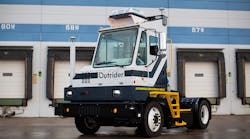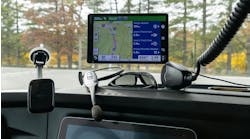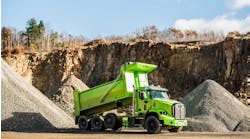After two years of working in stealth mode on autonomous yard truck technology, Outrider has raised $53 million in funding to launch a pilot program of self-driving electric trucks for automated distribution yards.
Outrider System started pilot programs this week with Georgia-Pacific and four Fortune 200 companies in designated sections of their distribution yards. Seed and Series A funding rounds for the new system were led by NEA and 8VC, respectively.
“In the United States, there's over 10 billion tons of freight being moved by trucks on an annual basis. And a majority of that passes through distribution yards,” Andrew Smith, founder and CEO of Outrider told Fleet Owner. “Distribution yards are those transmission points between those over the road operations and the factories, warehouses and rail yards that are moving or repackaging freight. The goals of these yards are to keep freight moving as quickly as possible to and from the road. And the problem is that the majority of these yard operations are almost entirely manual and inefficient. And it's been that way for decades.”
While truly self-driving trucks are years away from public roads, logistics yards offer a confined, private-property environment and a set of discrete, repetitive tasks ideal for autonomous technology, Smith said. “This is why an overarching systems approach – with an autonomous truck at its center – is key to automating every major operation in the yard.”
The Outrider System automates the repetitive, manual aspects of yard operations, including moving trailers around the yard, moving trailers to and from loading docks, hitching and unhitching trailers, connecting and disconnecting trailer brake lines, and monitoring trailer locations. At scale, Smith said Outrider would deliver yards that are more efficient, safer, and more sustainable.
Based in Golden, Colo., Outrider — previously known as Azevtec (Autonomous, Zero-Emission Vehicle Technologies) — has more than 75 employees, including 50 engineers focused on distribution yard automation.
Smith said there are three components of the Outrider System that solve the complexities of yard operations:
- It runs off an integrated, web-based interface that allows customers to dispatch the vehicle and operate it in the yard and integrates with existing supply chain software.
- The system’s infrastructure is designed to allow autonomous trucks to operate safely within this yard environment without posing risks to warehouse workers and other personnel.
- Outrider uses third-party electric yard truck platforms to transform them into fully autonomous vehicles, which includes sensor systems computer hardware, as well as a proprietary robotic system that enables the vehicles to not only move trailers around but to connect to and disconnect from trailers.
Smith declined to say which OEM’s yard trucks Outrider is working with other than to note it is more than one.
“What differentiates us from anything else you've read about the autonomous vehicle space is we do not just automate the truck, we automate all aspects of the yard,” Smith said. “This means we think about how we connect that truck to the different trailers or containers, and think about how we think we interact with loading bays. And we think about all the information and tools the customer needs to operate the system. We are focused on providing all this functionality in a way that meets requirements of operating 24 hours a day, 365 days a year.”
Distribution yards are dangerous places, Smith noted, as they are full of multi-ton pieces of metal moving around day and night — as drivers dump in and out of trucks — as warehouse workers load and unload trailers.
“The promise of autonomous vehicles is obviously massive,” Smith said. “There are certain applications, like ours, that have the potential to drive real value today.”
That value starts with an area, such as a distribution yard, that can be geofenced for automation that replaces a set of repetitive tasks. “And then you obviously have to be able to deliver a significant amount of value and address key customer pain points to have people who want you to build this system,” he said. “All these things contribute to that and why this is a place for yard automation. So we are Level 4 system or a system that doesn't have safety drivers we use safety technicians.”
The Outrider System can dispatch an autonomous electric truck “with a click or a swipe of your finger” from its web portal, he said.
Smith said his company is already seeing good demand for the Outrider System, which he is beta testing with large companies. “We are working in designated sections of our customers' yards this point with the clear roadmap to migrate to operating in yards fully, and then spreading across their networks and hundreds of distribution yards,” he said.
Georgia-Pacific’s eagerness to make their yards safer and more efficient led them to Outrider. “We’re constantly looking for ways to transform our company and the way we get work done, especially making work safer and more efficient and productive,” said Annant Patel, vice president of automation transformation at Georgia-Pacific. “Yard operations has been one of our opportunities, and Outrider has been a great partner to help us automate our pilot site.”
Smith said using electric-powered trucks is an important part of Outrider’s system. “Electric yard trucks are easier to operate and maintain than their diesel counterparts, and they lend themselves to better computer control. Our mission is to work with customers and suppliers to rapidly retire the more than 50,000 diesel-polluting yard trucks currently operating at logistics hubs throughout the U.S.”
To develop the safety case for its system, Outrider works with customers and outside experts. It also references existing functional safety standards and is helping define the next-generation standard for Level 4 Autonomy System Design.
"Outrider is introducing the transformational technology required for large, logistics-dependent enterprises to keep pace,” said Jake Medwell, founding partner at 8VC. "Our decision to be an early investor in Outrider was an easy one. Andrew’s vision and plan for the industry are highly compelling, and he’s mobilized an unmatched team to execute.”




